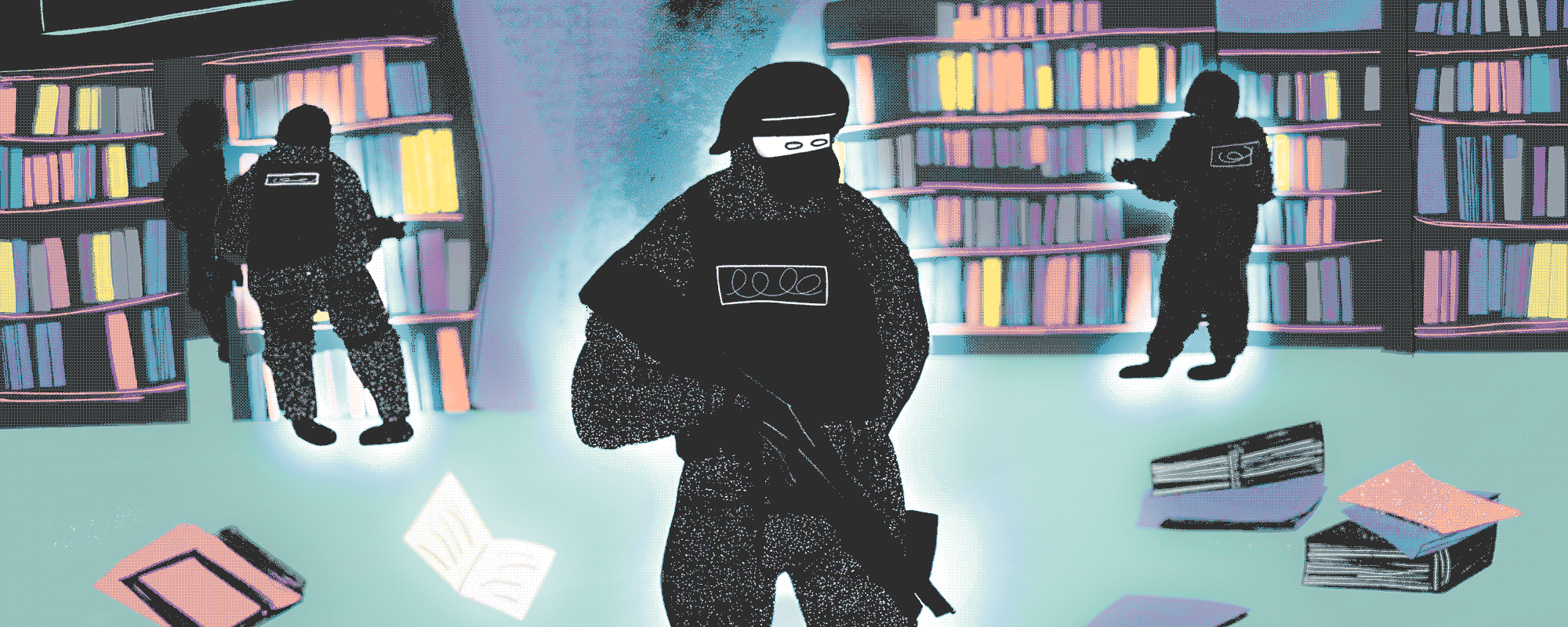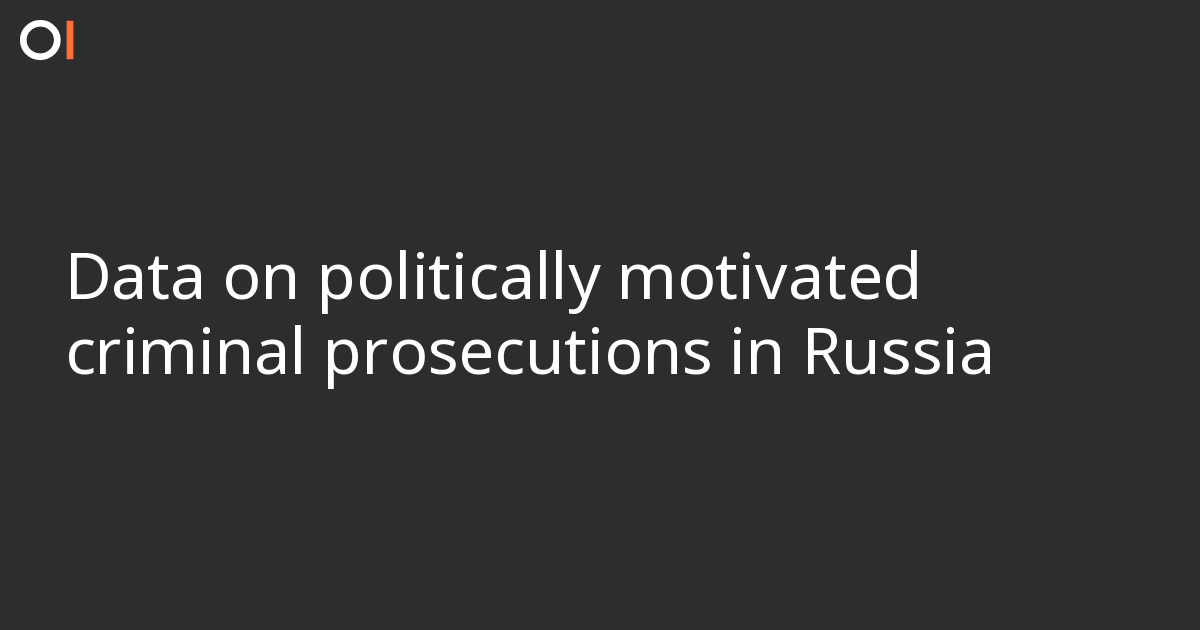Illustration: OVD-Info using AI
The charges of ‘public calls for terrorist activities’ and ‘organisation of extremist activity’ replacing those of ‘fakes.’
While 2025 is far from reaching its end, law enforcement officers have already managed to launch a number of high-profile criminal cases, for instance, against the employees of the ‘Individuum’ publishing house. Amid decreasing numbers of ‘fake news’ and ‘discreditation of the army’ charges we have assembled and analysed every piece of available information on political repression having taken place within the first six months.
The proportion of the war-related cases is in decrease
Throughout the first six months of 2025 law enforcement officers initiated politically motivated criminal cases against at least 173 individuals. This data may not presently be compared to the similar period of the last year as in some cases the month when persecution started is yet unknown. Moreover, for some cases the data might be totally unavailable so the current information on repressions is obviously incomplete. Nevertheless, it may be stated with certainty that the numbers of the new defendants in politically motivated criminal cases continue to decrease after their rapid surge in 2022. This is most likely related to the increase of self-censorship due to harsh sentences received by the defendants of the ‘anti-war’ cases during the first years of the war.
The number of the defendants in the cases particularly related to the war in Ukraine is also decreasing. Whereas throughout the first two years of the war over a thousand individuals faced this sort of persecutions, these numbers have subsequently been dropping. By the end of 2024 the share of ‘anti-war’ and war-adjacent persecutions had dropped to 43% whereas in 2023 it comprised more than 60%. By the summer of 2025 the share of the new essentially war-related persecution cases was at 37%. For instance, in May a local resident Alexander Shevtchuk was remanded to a pre-trial detention centre by the Blagoveshchensk (Far East) city court for leaving a comment in a Telegram channel concerning ‘shell famine’ at the front.
Amongst the war-related cases lead those initiated by the actions estimated by the prosecutors as support to the ‘Russian Volunteer Corps’ or to the ‘Freedom of Russia’ Legion (for instance, in the form of the comments on social networks). Out of 138 cases overall for different political reasons in 2025, the acts of persecution directly connected to the anti-war statements and other forms of protest against the military actions in Ukraine only concerned 35 individuals.
Posts mentioning ‘Russian Volunteer Corps’ and ‘Freedom of Russia» Legion served as evidence for charges of calls for terrorist activities (article 205.2 of Criminal Code). Such was the case for 31 individuals, making it the most common politically motivated criminal charge in 2025.
Another 26 individuals were charged with the organisation of extremist activity (article 282.2 of the Criminal Code). Some of these were prosecuted for affiliation with Jehovah’s Witnesses, some others — for «propaganda of LGTBQA+ movement.» The latter group includes defendants in the Individuum publishing house case, which is recognised as the most drastic intervention into the publishing business since 2022.
So far in 2025 most defendants of politically motivated cases are charged with public calls for terrorist activities and organisation of extremist activity
A number of other politically motivated criminal cases in 2025 have been initiated on the charges of rehabilitation of nazism (article 354.1 of the Criminal Code): in most cases the charges originated in unintentional desecration of Eternal Flame memorials. Another 26 individuals were charged as a consequence of previously imposed restrictions — they were either accused of facilitating the activities of «undesirable» organisations or evading «foreign agent» duties. Only 16 individuals were charged with spreading «fakes» and discreditation of Russian forces — eight for each charge.
Among other (1 to 7 individuals) criminal offences imputed in politically motivated cases are public calls for extremist activity (article 280 of the Criminal Code), incitement of hatred or hostility (article 282 of the Criminal Code), and organisation of and participation in a terrorist organisation (article 205.4 of the Criminal Code).
The typical defendant in a 2025 political case is a man from Moscow or St. Petersburg
20.8% of defendants in politically motivated criminal cases in 2025 are residents of Moscow and St. Petersburg. In addition to the 36 people in these two biggest cities, 137 are being persecuted for political reasons in other regions, e.g.:
- eight in Krasnoyarsk Krai, seven of whom were accused of participating in the activities of the ‘AllatRa’ group;
- eight in Ekaterinburg region, two of whom were accused of insulting historical memory;
- seven in occupied Crimea, which remains one of the most repressed territories controlled by Russia.
Additionally, one to six individuals became defendants in political cases in each of the 47 remaining regions. For thirteen individuals the location is yet unknown.
Moscow and St. Petersburg remain regions with the highest number of political persecutions in 2025
In 2025, men aged 31 to 50 have been most often subjected to political persecution: 47 defendants in criminal cases fell into this category. Another 25 defendants are men aged 51 to 70. The number of women in the same age categories who have become victims of persecution is 2 to 3 times lower.
Several dozens of people released from politically motivated detention
During the first six months of 2025, in contrast with many new politically motivated cases, 42 individuals were released from detention. Among them are Remzi Memetov, Rustem Abiltarov and Zevri Abseitov, all of whom had served nine years in penal colony on charges of participating in the activities of ‘Hizb-ut-Tahrir’ group, or the defendant in the «Network» case, Viktor Filinkov, who served a seven year term.
Timur Khairutdinov



 Download PDF version
Download PDF version
